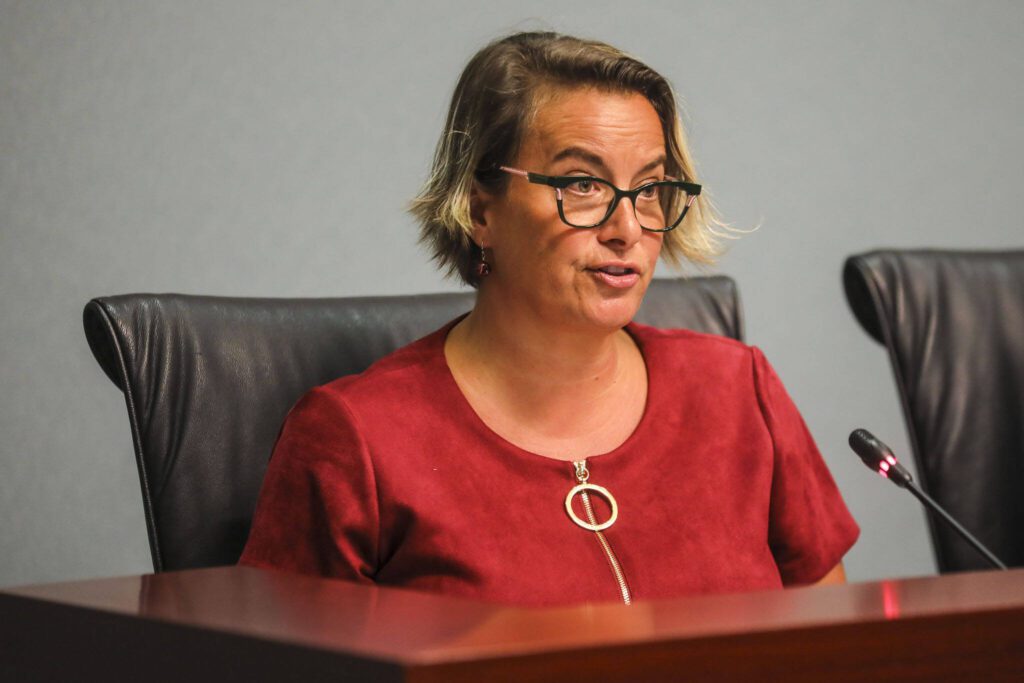EVERETT — Mayor Cassie Franklin’s proposed 2024 city budget would close a $13 million deficit, she told the City Council on Wednesday.
The proposed budget is intended to maintain the city’s current service levels and also make “small, but essential strategic investments in areas of greatest community need,” she said in her address.
While the mayor’s proposed budget for 2024 is balanced, the city projects a $13 million deficit in 2025.
The budget prioritizes staff increases in the police department.
Nine new positions within the Everett Police Department would be created under the mayor’s proposed budget. Seven of those would be funded through a federal grant.
“We were able to close this year’s gap with the support of grant funding, one-time outside funding, revenue from boosts in our economy and some unsustainable budget balancing action,” Franklin said.
Under the mayor’s proposal, the city expects to collect $424.6 million next year and spend $438.8 million. Meanwhile, the forecast for the city’s finances show a growing deficit, increasing in tens of millions of dollars over the next few years.
This year’s revenue from sales taxes, construction fees and business and occupation taxes were all higher than anticipated, city spokesperson Simone Tarver said. The city expects to collect $5.3 million more than initially expected.
In addition, the city suspended 2024 investments in the Law Enforcement Officers’ and Fire Fighters’ Retirement System Plan 1 and the Capital Improvement Program, saving the city $7.9 million combined. Money from the federal American Rescue Plan Act totaling $1.1 million was put toward “human needs related programs,” according to a city presentation. Human needs projects support people affected by homelessness, substance use disorder and behavioral health issues.
The city would also pull $559,735 from its “Rainy Day Fund,” Tarver said.
“We’ve had many tough decisions to make,” Franklin said at the meeting. “We found places to make reductions and have worked to close this gap.”
An increase in shootings and gun-related incidents reflect a clear need for more police officers, Franklin said. She mentioned the fatal Sept. 8 shooting of a 15-year-old boy while waiting for the bus stop as specifically weighing heavy on her mind.
“Our residents, business owners and visitors deserve to feel safe in our city, but I know many do not,” she said.
Just an hour prior to the city council meeting, three teenagers were arrested Thursday in connection to a shooting that caused no injuries.
A wellness coordinator for the police department is another new position that would come with the budget. This position would act as a counselor for officers struggling with mental health issues.
“In order for our officers to be there for us, we need to be there for them,” Franklin said. “(Everett Police) Chief (Dan) Templeman and I want to ensure our officers have access to the resources they need.”
In the coming year, the city would also begin to work on planning and constructing more green spaces. The city allocated $33.9 million in Economic & Cultural Vitality, which includes city events and park improvements.
The budget plans for a stormwater park in the Holly neighborhood of south Everett. Stormwater parks are designed to withstand and store floodwater, while also providing recreational space for residents. Also in the budget is money to replace playgrounds in Edgewater and Kiwanis parks.
The city plans to replace the Edgewater Bridge on Mukilteo Boulevard and to build a new bridge that will connect the Everett Point Industrial Center on the riverfront to Everett Avenue.
The city is growing rapidly, requiring “strategic investments” about where to put the city’s limited funds, Franklin said.
In the next 20 years, the city’s population could grow with 66,000 additional people, according to a 2016 Metro Everett report. That’s a more than 50% increase from the current population of 116,000.
The two main sources of revenue for the city are property and sales taxes.
“In the coming months, I intend to work with our council to deeply consider solutions that would help us get on a more sustainable path,” she said.
Residents will have the chance to comment on the budget at future council meetings. The first reading of the budget ordinance will be at the council’s meeting Nov. 8.
The council is expected to approve next year’s budget in late November.
Correction: A previous version of this story mistakenly noted budget deficits would increase in the next few decades. The forecast is for years, not decades. It also reported the city expects $5.7 million more than expected from several taxes and fees. The prediction is for $5.3 million. And the final budget vote is expected to be in late November, not early December.
Jenelle Baumbach: 360-352-8623; jenelle.baumbach@heraldnet.com; Twitter: @jenelleclar.
Talk to us
> Give us your news tips.
> Send us a letter to the editor.
> More Herald contact information.


























